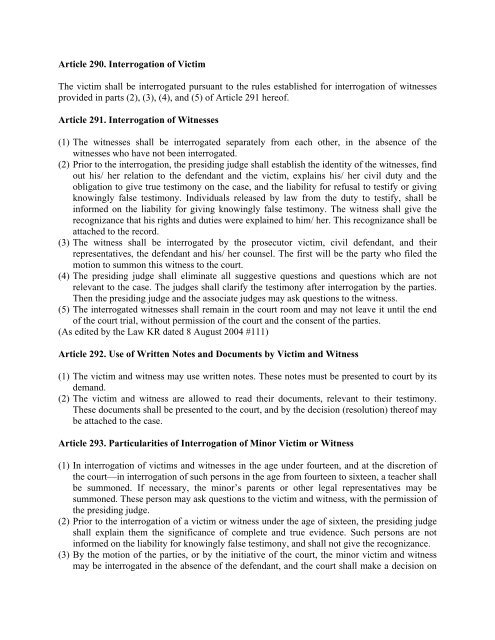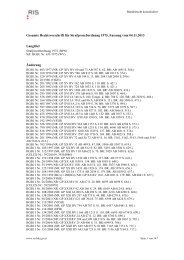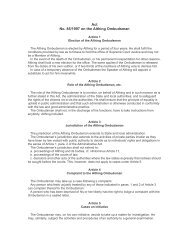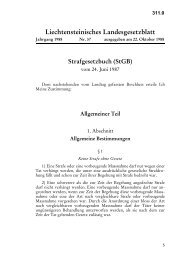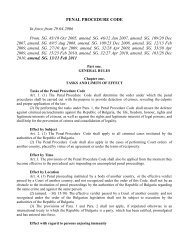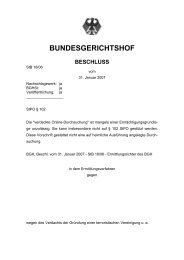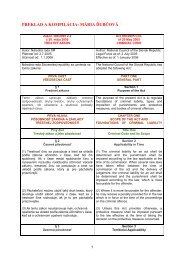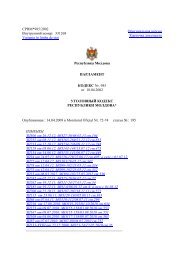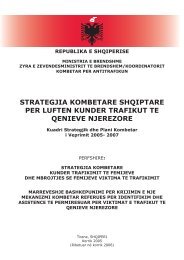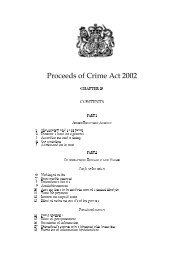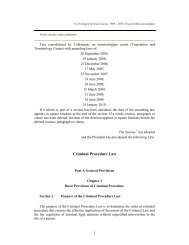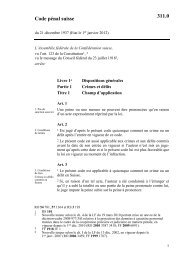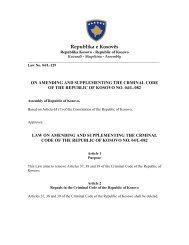Criminal Procedure Code of the Kyrgyz Republic - Legislationline
Criminal Procedure Code of the Kyrgyz Republic - Legislationline
Criminal Procedure Code of the Kyrgyz Republic - Legislationline
Create successful ePaper yourself
Turn your PDF publications into a flip-book with our unique Google optimized e-Paper software.
Article 290. Interrogation <strong>of</strong> Victim<br />
The victim shall be interrogated pursuant to <strong>the</strong> rules established for interrogation <strong>of</strong> witnesses<br />
provided in parts (2), (3), (4), and (5) <strong>of</strong> Article 291 here<strong>of</strong>.<br />
Article 291. Interrogation <strong>of</strong> Witnesses<br />
(1) The witnesses shall be interrogated separately from each o<strong>the</strong>r, in <strong>the</strong> absence <strong>of</strong> <strong>the</strong><br />
witnesses who have not been interrogated.<br />
(2) Prior to <strong>the</strong> interrogation, <strong>the</strong> presiding judge shall establish <strong>the</strong> identity <strong>of</strong> <strong>the</strong> witnesses, find<br />
out his/ her relation to <strong>the</strong> defendant and <strong>the</strong> victim, explains his/ her civil duty and <strong>the</strong><br />
obligation to give true testimony on <strong>the</strong> case, and <strong>the</strong> liability for refusal to testify or giving<br />
knowingly false testimony. Individuals released by law from <strong>the</strong> duty to testify, shall be<br />
informed on <strong>the</strong> liability for giving knowingly false testimony. The witness shall give <strong>the</strong><br />
recognizance that his rights and duties were explained to him/ her. This recognizance shall be<br />
attached to <strong>the</strong> record.<br />
(3) The witness shall be interrogated by <strong>the</strong> prosecutor victim, civil defendant, and <strong>the</strong>ir<br />
representatives, <strong>the</strong> defendant and his/ her counsel. The first will be <strong>the</strong> party who filed <strong>the</strong><br />
motion to summon this witness to <strong>the</strong> court.<br />
(4) The presiding judge shall eliminate all suggestive questions and questions which are not<br />
relevant to <strong>the</strong> case. The judges shall clarify <strong>the</strong> testimony after interrogation by <strong>the</strong> parties.<br />
Then <strong>the</strong> presiding judge and <strong>the</strong> associate judges may ask questions to <strong>the</strong> witness.<br />
(5) The interrogated witnesses shall remain in <strong>the</strong> court room and may not leave it until <strong>the</strong> end<br />
<strong>of</strong> <strong>the</strong> court trial, without permission <strong>of</strong> <strong>the</strong> court and <strong>the</strong> consent <strong>of</strong> <strong>the</strong> parties.<br />
(As edited by <strong>the</strong> Law KR dated 8 August 2004 #111)<br />
Article 292. Use <strong>of</strong> Written Notes and Documents by Victim and Witness<br />
(1) The victim and witness may use written notes. These notes must be presented to court by its<br />
demand.<br />
(2) The victim and witness are allowed to read <strong>the</strong>ir documents, relevant to <strong>the</strong>ir testimony.<br />
These documents shall be presented to <strong>the</strong> court, and by <strong>the</strong> decision (resolution) <strong>the</strong>re<strong>of</strong> may<br />
be attached to <strong>the</strong> case.<br />
Article 293. Particularities <strong>of</strong> Interrogation <strong>of</strong> Minor Victim or Witness<br />
(1) In interrogation <strong>of</strong> victims and witnesses in <strong>the</strong> age under fourteen, and at <strong>the</strong> discretion <strong>of</strong><br />
<strong>the</strong> court—in interrogation <strong>of</strong> such persons in <strong>the</strong> age from fourteen to sixteen, a teacher shall<br />
be summoned. If necessary, <strong>the</strong> minor’s parents or o<strong>the</strong>r legal representatives may be<br />
summoned. These person may ask questions to <strong>the</strong> victim and witness, with <strong>the</strong> permission <strong>of</strong><br />
<strong>the</strong> presiding judge.<br />
(2) Prior to <strong>the</strong> interrogation <strong>of</strong> a victim or witness under <strong>the</strong> age <strong>of</strong> sixteen, <strong>the</strong> presiding judge<br />
shall explain <strong>the</strong>m <strong>the</strong> significance <strong>of</strong> complete and true evidence. Such persons are not<br />
informed on <strong>the</strong> liability for knowingly false testimony, and shall not give <strong>the</strong> recognizance.<br />
(3) By <strong>the</strong> motion <strong>of</strong> <strong>the</strong> parties, or by <strong>the</strong> initiative <strong>of</strong> <strong>the</strong> court, <strong>the</strong> minor victim and witness<br />
may be interrogated in <strong>the</strong> absence <strong>of</strong> <strong>the</strong> defendant, and <strong>the</strong> court shall make a decision on


